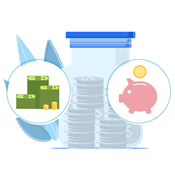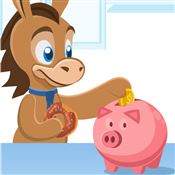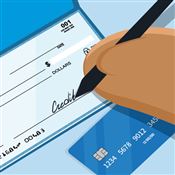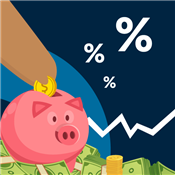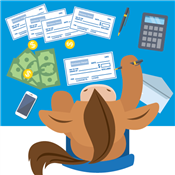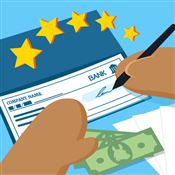How Much Money Should I Have in My Checking Account
When it comes to your checking account balance, how much is too much? Discover the right amount and how to tell if you're missing out on interest.
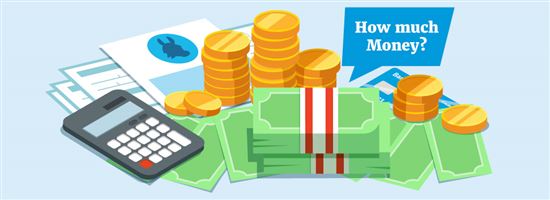 |
What's the right amount to have in your checking account?
If you don't have enough, you risk steep overdraft fees. If you have too much, you're missing out on earning more with compound interest.
In this article, we'll go over exactly how much you need for your unique situation. Plus, learn the best places to put your money to suit your financial goals.
How Much Money Do You Need in Your Checking Account?
You should try to have at least 1-2 months' worth of living expenses in your checking account.
But having some extra padding in your account is a good idea ($100-$500, depending on your spending habits).
After your bills are paid for the month, you should have enough left to your account for small, unexpected expenses. This will help you avoid any overdraft fees and insufficient funds fees.
You'll also need to make sure your balance doesn't dip below the minimum balance requirement, if you have one.
A checking account is an expense account meant for everyday banking transactions, like purchases and bill pay. These accounts also come with a debit card, paper checks and unlimited withdrawals/deposits. Checking accounts don't typically earn interest.
Is it bad to have a lot of money in a checking account?
Avoiding fees is important, but there is a limit on how high your checking account balance should be.
That's because checking accounts typically don't earn any interest, so the money in your account is just sitting there.
In fact, it's losing value due to annual inflation, which averages about 2% each year. When the dollar loses value, you lose spending power.
For example, if you had $100 in your account, the actual spending power of that money one year later would only be $98, two years later it would be worth $96.04, and so on.
Other types of accounts are meant to grow your money, including:
- High-yield savings accounts
- Certificates of deposit (CDs)
- Money market accounts
- Retirement accounts
Another reason to avoid having too much money in your checking account is that it is much more tempting to spend.
How to Calculate How Much You Need in Your Checking Account
Use the following formula to calculate how much money to keep in your checking account.
+ Minimum Balance Requirement
+ Total Monthly Expenses
+ Overdraft Cushion ($100 to $500)
= How Much You Need in Your Checking
Now, let's get into a little more detail.
Step 1: Check Your Minimum Balance Requirement
The absolute minimum you always need in your checking account is your bank's minimum balance requirement.
Check with your bank to review how much you need to maintain in your account to avoid fees or penalties (or, choose a checking account without a minimum).
Step 2: Calculate Your Total Monthly Expenses
Your monthly expenses fall into two categories: Recurring bills and day-to-day spending.
To find your total recurring bills, log into your online banking and review the past few statements. Understand how much you normally owe and when each payment is withdrawn from your account.
- Rent/Mortgage
- Car payment
- Insurance (auto, home, life, etc.)
- Utilities
- Telecommunications (cell phone, internet, cable)
- Streaming services
- Credit card payment
Next, review all your day-to-day spending. This includes online shopping, coffee, groceries, gas, snacks, eating out, alcohol, and any other expenses that are not a set amount each month.
Step 3: Maintain an Overdraft Cushion
Life happens. Sometimes you'll want to splurge, sometimes you get stuck with the bill at dinner, and we can all lose track of our spending from time to time.
In order to avoid overdraft fees or bouncing a check, maintain a $100 to $500 overdraft cushion in your checking account on top of what you absolutely need.
Signs You Have Too Much Money in Your Checking Account
If any of these sound familiar, consider placing your money in an alternative account, adding it to your retirement fund, or investing your money.
- If You Never Have to Check Your Balance
Being confident in your finances is great. However, if you never need to check your checking account balance to see if you can cover expenses, you're probably stashing too much cash there. - If You Don't Have a Savings Account
If you don't have or maintain a savings account at all and you keep 100% of your money in your checking account, it's very likely that you have too much in checking.Next steps: Review the best high-yield savings accounts to help your money grow. - If You Have More Than 3-6 Months of Expenses in Checking
If you have more than a few months of expenses in your checking account, you definitely have too much. This is what's known as your emergency fund, which we'll cover in more detail below.
Where to put extra money if there's too much in your checking account
 |
If you find that you've been keeping too much money in your checking account, here are some ideas of where to put that additional cash so it can be put to use, earn interest, and grow over time.
Put Short-Term Funds into Your Emergency Savings
The first place to put any overflow money from your checking account is into your emergency fund savings account.
This account will cover any necessary expenses in the event of a job loss or an emergency expense, like an auto repair bill or medical expensed.
Put Short-Term Funds Toward a Specific Savings Goal
If your checking account is maxed out and you have a full emergency fund, you can now start saving for specific short-term or medium-term expenses, such as a vacation, new car, or a luxury item you've had your eye on for a while.
Some financial advisors recommend opening a separate savings account for each major savings goal. This may make it easier to track your progress.
Put Medium-Term Funds into a Certificate of Deposit
A good place to keep medium-term funds is into a certificate of deposit account. These are best used for money that you'll want to use in one to three years.
The benefit of CDs over savings accounts is that your interest rate is locked in.
If you sign up for an 18-month CD at 2% interest, for example, you'll earn exactly that much interest. Traditional savings accounts have variable interest rates, which means they can change at any time — and often do — with no warning.
Feel free to shop around for the best rate. You can't access your money until the term expires anyway, so there is no real benefit of opening up a CD at your existing bank if it doesn't offer the best rate.
Put Long-Term Funds into Your Retirement Account
For long-term savings, look to your retirement account. Retirement accounts can take the form of a 401(k), IRA, Roth IRA, etc.
These are often provided through your employer, but if you're a freelancer or business owner, you are also able to open up a retirement account as an individual.
Roth contributions are made after taxes, so withdrawals during retirement are tax-free. Traditional 401(k) contributions are made from pre-tax income, but taxed as income upon withdrawal. If you expect to be in a higher tax bracket when you retire than you are now, choose a Roth account.
Funds invested will go into what's called a brokerage account, which invests the money into a combination of stocks and bonds.
Investment accounts carry the highest risk of loss, but also have the most potential to earn income.
For example, a high-yield savings account at the beginning of 2021 would likely carry around 0.50% interest. Meanwhile, the average return on the S&P 500 is just under 10%.
Bottom Line
Having too little or too much money in your checking account can create problems — primarily lost money due to fees and charges on the one hand or missing out on profits from interest on the other.
Use this guide to determine how much money you need in your checking account so you can always maximize your income potential.
Write to Justin Barnard at feedback@creditdonkey.com. Follow us on Twitter and Facebook for our latest posts.
|
|
| ||||||
|
|
|
